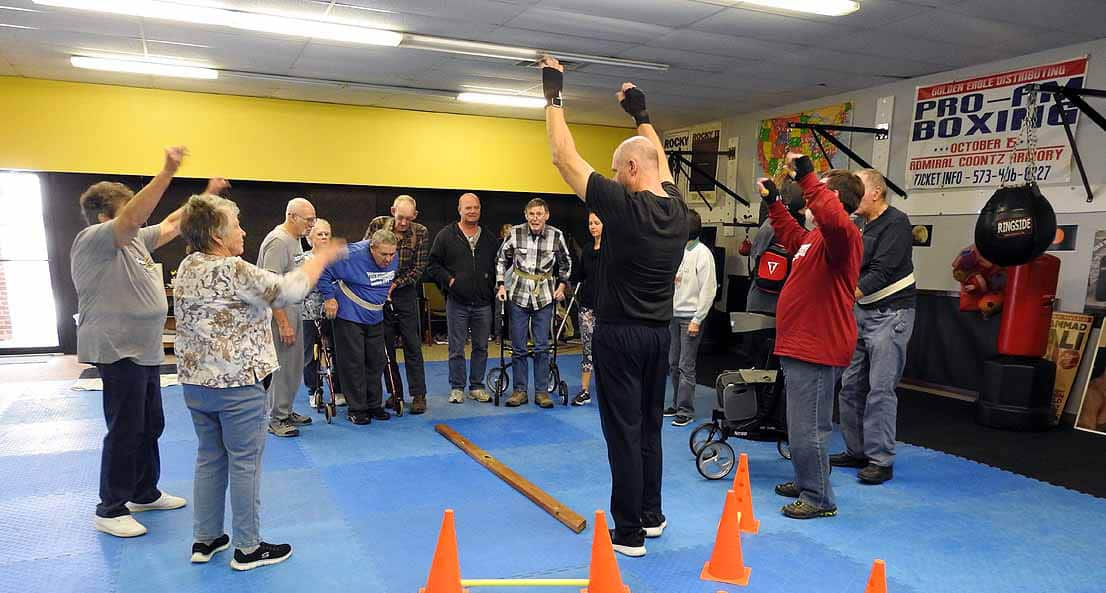Alumni Spotlight: Mike Crager ('87)
A Puncher’s Chance
In the tiny town of Monroe City, Missouri, Mike Crager (’87) opened a boxing gym to help individuals afflicted with Parkinson’s disease – himself included.
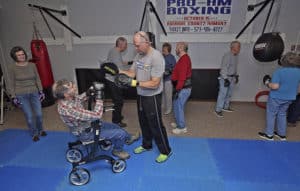
“When I got my diagnosis, I was depressed about what would happen,” he said. “What I’m trying to do with my gym is to help people with Parkinson’s and let them know there is a place they can train and make friends with people and caregivers who are struggling with the disease.”
Crager’s gym in Monroe City, Missouri, is about more than a sense of fraternity. In recent years, non-contact boxing exercises have shown promise in helping Parkinson’s patients stave off some of the symptoms related to the progressive nervous system disorder. Crager knows firsthand how effective the training can be. He first participated in 2006 after his wife, Marla, learned of a gym in Indianapolis that specialized in working with Parkinson’s patients.
“It was a revolutionary new way to manage the symptoms,” he said. “I saw immediate improvement in my walking gait and overall fitness, and maybe most of all my mental attitude.”
Crager has always been a tough, active guy. When a hand injury sidelined his days on the University football team, he channeled his energy into Taekwondo, eventually becoming a third-degree black belt.
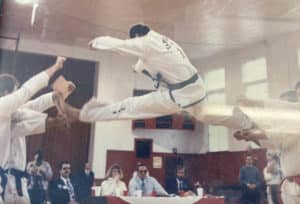
Throughout the entirety of his 28-year teaching career he also coached football, baseball and track. A Parkinson’s diagnosis was not on his radar at age 42, but his family urged him to see a doctor after noticing a lack of movement in his left arm and some stiffness when he moved.
“He had me walk up and down his office hallway, and by checking a couple of physical tests told me he felt like I showed the outward signs of early onset Parkinson’s disease, and I needed to go see a neurology specialist, who confirmed the first diagnosis,” Crager said.
Inspired by his experience in Indianapolis, Crager used his Bulldog tenacity to help not only himself, but others afflicted with Parkinson’s disease. About six years ago, with the encouragement of his best friend, J.R. Derksen, he started a boxing club in Derksen’s basement with one other fighter. As the operation grew, they moved to the local high school weight room and eventually a dedicated facility in Monroe City. Crager estimates he has worked with more than 40 individuals, and he currently has a stable of 15 fighters.
“Even though it’s non-contact, we call them fighters because they are fighting the disease.”
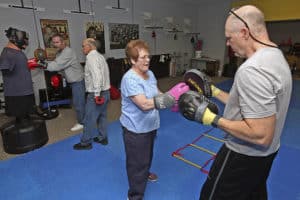
“He put in a lot of hard work,” Crager said. “The training forces the body to keep up the effort. It helps with tremors and other symptoms. Through intense training people have seen remarkable improvement, or in some cases their symptoms almost vanish.”
Make no mistake, Crager’s approach to training is not rooted in denial, and he is not promising false hope to others afflicted with the disease. The noticeable symptoms he has make it clear he is familiar with just how terrible Parkinson’s can be, and his Uppercut Boxing Gym only charges fighters who train there a fraction of what they would pay in a city. The gym relies largely on the support of donors. One fundraising effort of note is a wall calendar featuring some of the fighters and their caregivers. It not only supports the gym, it puts a face on Parkinson’s disease and displays courage in the face of adversity.
“My fighters are all amazing people. Everyone has a Parkinson’s disease story, and everyone gives it their all, all of the time,” he said. “We can’t do what we do without money coming in to buy new equipment or to replace gloves.”
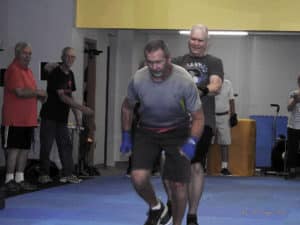
Crager continues to welcome new fighters, and those interested in training with him can contact him by email. He has been in “the fight game” long enough to be a realist. There may come a day when Parkinson’s disease is just a distant memory, but it doesn’t appear to be any time soon. That’s not what matters for Crager. This Bulldog is will continue to hold on and fight until the very end.
